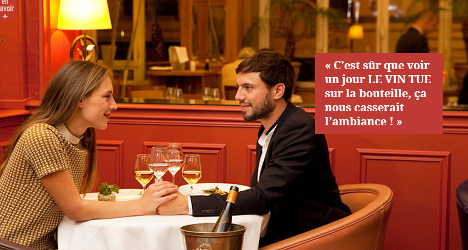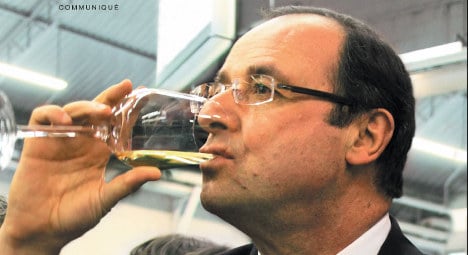All is not well with France's famed wine industry.
Despite fears of a rise in wine taxes seemingly having been allayed by the country’s agriculture minister this week, industry leaders are still nursing a headache over government plans to reinforce health warnings on wine bottles and packaging.
In reaction to the plan, leaders of the wine industry – which represents France’s second-biggest export sector – have mobilised and created a lobby group Vin et Societé (Wine and Society) to take on the government.
It launched its publicity campaign last month, including a new website, which featured a photograph of French President François Hollande enjoying a glass of wine with the message: “Thank You, Mr President, for your support for our country’s second-largest export earner.”
What has riled the wine industry, however, apart from mooted tax hikes, is a plan to reinforce health warnings, including on wine bottles, as well as to ban positive talk about wine in the French media.
'Vin and Societé' have slammed the “moralising trend” which will “reduce personal responsibility” among French people.
According to Sud Ouest newspaper, the French government plans to change the warning from "Alcohol abuse is dangerous for your health" to "Alcohol is dangerous for your health".
For Bernard Farges, chair of CIVB (Comité interprofessionnel des Vins de Bordeaux), who recently described talks with the French government as "alarming", the change is "unacceptable" becasue "the concept of moderate drinking will disappear".
“You cannot warn about the dangers of alcohol or suggest how many glasses you should drink by putting it on a label on a bottle of wine. People need to be educated about this," Farges tells The Local.
“It’s like the logo for pregnant women, which warns them to avoid wine. Women should be taught about the dangers, that’s a job for schools, not for wine bottle labels. The purpose of the wine label is to teach people about the wine. You cannot insult the consumer’s intelligence.
“These measures are bad for the industry and bad for our image. French wine is a very good product. Wine makers in Italy are not up against the same problems we are in France and it could become difficult for our industry in a few years.

("Of course seeing "wine kills" on the bottle will ruin the atmosphere." Vin et Societé)
Whether Farges is right or not, one thing is certain – there is plenty at stake for his industry.
Despite a fall in domestic consumption, France remains the world’s largest producer of wine and is the world’s largest wine exporter, with €7.84 billion worth of plonk heading abroad each year, mostly to the US and China.
“How will we be able to explain to our Japanese and Chinese clients that the wine they are buying is bad for their health?
“We are being treated like drug dealers. We cannot accept that."
Powerful lobby at work
Farges believes the move is being pushed ahead to appease a lobby group that has, in his view, become all too powerful in France and is encouraging the government to take “repressive measures”.
“In France there is a health lobby which includes a small number of very influential people,” he said. “These people are very close to the minister of health. The ministers in France have been traumatized by the contaminated blood scandal in the 1980s and the deadly heatwave of 2003. Now they're scared.
"Some advisers at the Ministry of Health want to see the consumption of wine in France fall, to reduce alcoholism," said Farges. "But this policy does not work."
Farges believes the wine industry is being punished for a change in French drinking culture which continues to concern authorities, but which he says has nothing to do with plonk.
“Since binge drinking arrived in France, the consumption of wine has actually gone down, but drunkenness has increased,” he said. “The government wants to solve the problem of alcoholism, that’s normal, it is an illness, but these policies just don’t work.
“People who have problems with alcohol tend to drink spirits rather than wine and the young people who binge drink normally have cocktails."
Farges says if the aim is really to cut down on drinking, then young people need to be educated and “socialized” using “responsible discourse” rather than health warnings on packaging.
“France’s wine industry is vital for the country both economically and culturally. The government should not treat everyone in France as an alcoholic.”
Should wine carry clear health warnings or do you agree with Bernard Farges?
Don't miss a story about France – Join us on Facebook and Twitter.



 Please whitelist us to continue reading.
Please whitelist us to continue reading.
Member comments